August 07, 2020
The Making of Lawrence Brownlee and Friends: The Next Chapter
“I think this is a pretty good example of what we’re capable of,” says tenor Lawrence Brownlee. “And it’s not just classic opera.” Brownlee is talking about Lawrence Brownlee and Friends: The Next Chapter, the recently released free virtual concert by Lyric’s Ryan Opera Center celebrating Black artistry. The program, hosted by Brownlee and featuring prominent Ryan Opera Center alumni--soprano Whitney Morrison, mezzo-soprano J’Nai Bridges, and baritone Will Liverman--along with current Ryan Opera Center Ensemble members, streamed live on July 26 on YouTube and Facebook and is currently available for replay. But putting together the program was something of a year’s long process.
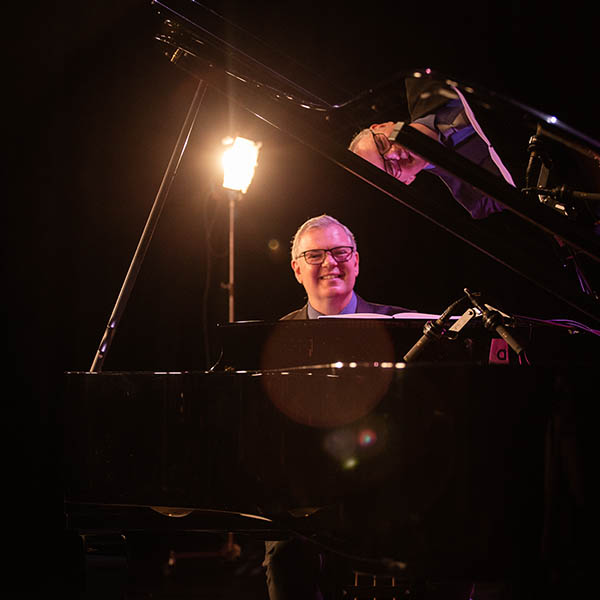
Ryan Opera Center music director Craig Terry in Lawrence Brownlee and Friends: The Next Chapter.
Last fall, Lyric presented a concert titled “Lawrence Brownlee and Friends.” The event aimed to build on the company's diversity initiatives by creating a program that connected with a broader audience than typically found at the opera. Chicago, of course, is a culturally and ethnically rich city, but this diversity is rarely seen across some of the artistic institutions that have come to define the city. This is a two-fold problem, one representing the lack of diversity in the institutions themselves as well as more broadly across the artistic mediums.
“A lot of times, you go and look in the audience and it’s 99 percent caucasian. You don’t see very much diversity,” Brownlee says. “The nice thing about Lyric Opera of Chicago [is that] they’ve had a long commitment to colorblind casting, where they’ve given great opportunities to people of color. They want to continue those efforts, but there’s also a need to address audience diversity. As an artist, it’s nice to look out in the theater and see people that look like you.”
Lyric traditionally offers a free annual concert in Millennium Park. This year, the plan was to transform the concert into an event showcasing the Ryan Opera Center, but the COVID-19 pandemic changed everyone's plans and brought the concert online, which ultimately increased accessibility to an even wider potential audience. After the murder of George Floyd, Craig Terry, Ryan Opera Center music director, knew this concert needed to be more than just a virtual showcase.
“Thinking about the last four months and what has happened in Chicago and around the world, and thinking about the first product for Lyric to produce post-protests [...] in the middle of a pandemic, we immediately felt [like] we had to spotlight incredible Black artists, put them in the forefront,” says Terry. He proposed the idea to Lyric General Director Anthony Freud, who immediately embraced it and suggested engaging Lawrence Brownlee as artistic advisor and host, in addition to guest artists.
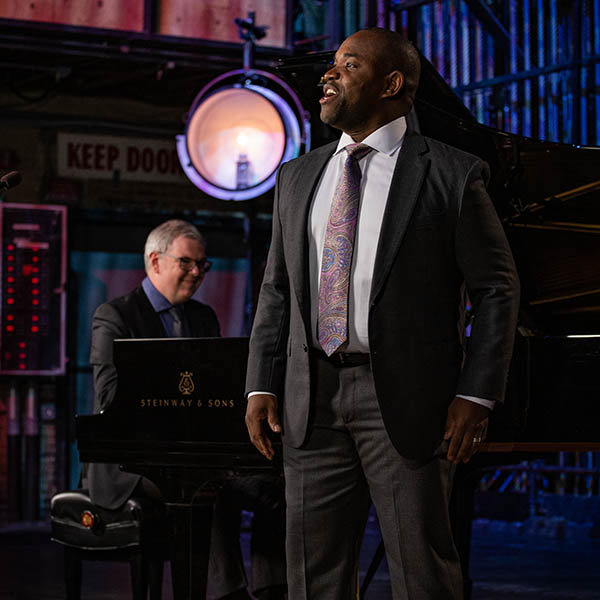
Lawrence Brownlee performing in Lawrence Brownlee and Friends: The Next Chapter.
The concert aligns with Lyric’s guiding principles which include “creating opportunities for new audiences to experience the magic of Lyric,” and igniting creativity across Chicago by “marshalling all the artistic disciplines of opera to engage Chicagoans of all ages and backgrounds from across the city in innovative learning opportunities and artistic creation.” In many ways, Lawrence Brownlee and Friends: The Next Chapter is the perfect encapsulation of these ideas.
Besides serving as a showcase for established Black artists, the performance also introduced a number of rising Ryan Opera Center talents, including tenors Martin Luther Clark and Lunga Eric Hallam, baritone Leroy Davis and pianist Chris Reynolds. “You see their joy and their excitement,” Brownlee says. “I am very excited about their talents, about their future, and about their enthusiasm for this project. They really were committed to it and wanted to be expressive artists. It's something that I believe will be very apparent in the broadcast.”
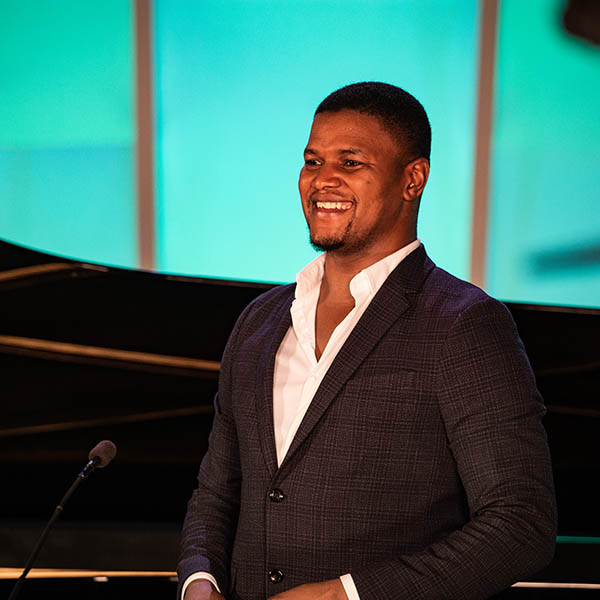
Tenor Lunga Eric Hallam in Lawrence Brownlee and Friends: The Next Chapter.
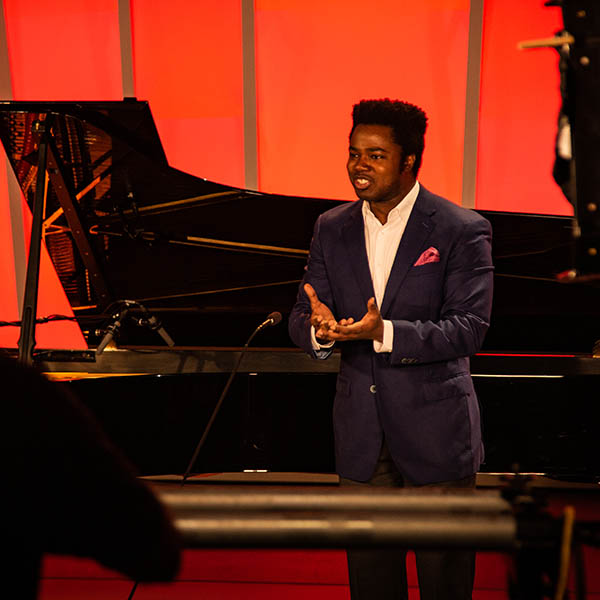
Baritone Leroy Davis in Lawrence Brownlee and Friends: The Next Chapter.
Repertoire was chosen by the artists, resulting in a mix of arias, songs, and spirituals to highlight the broad range of their talents. “It’s important to sing things you love,” Brownlee says. “Everybody brought something to the table that they wanted to sing. You will never do a better job at expressing yourself and being an artist—a communicative artist—than when you perform things that really bring you joy, because it delivers so much for the audience to take in.”
After gathering the performers’ selections, Terry created a program that brings listeners through a variety of emotions, a goal of any great operatic event. “I think at any concert, you want to make people in the audience smile and laugh and think and cry; feel all of the emotions that human beings expect from art,” Terry says. “And I think in this program, we have all of those things in great supply: tremendous joy, things that will make you grin for minutes and minutes, and things that will make you cry.”
From the initial idea to the premiere, the entire newly reimagined project took about six weeks to put together, with Terry doing “the lion’s share of the planning,” according to Brownlee. “He’s a master arranger and great with programming. He assembled an incredible compilation of selections we all like to sing, of things that are very diverse, different styles, [and] different composers.”
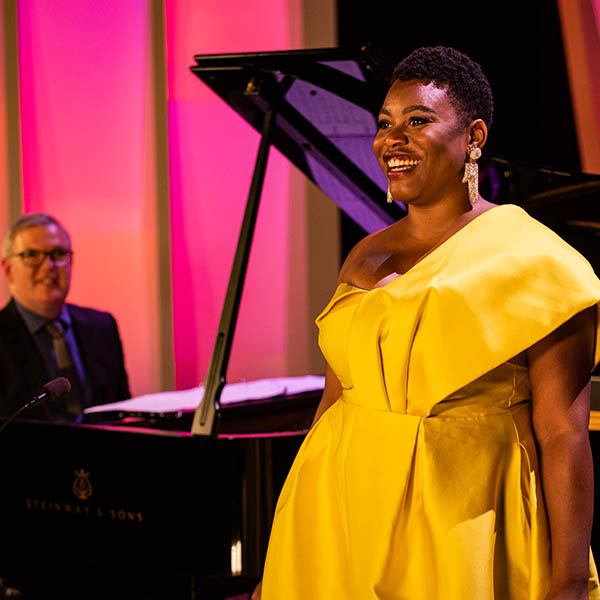
Soprano Whitney Morrison in Lawrence Brownlee and Friends: The Next Chapter.
The performers came to the opera house for the first time in months to record the program, observing the most stringent health and safety standards to ensure the safety of the extraordinarily committed artists and staff working behind the scenes. According to Terry, the experience of hearing live music again was just as powerful as seeing the people performing it. “There were tremendous tears on the first day that we were back in the opera house,” Terry says. “I hope that our audience for this concert will feel real music-making in real time, with two performers connected, in a way that they haven’t really been able to hear for a long time.”
Brownlee opened the program with "Ah, mes amis" from La fille du régiment. Followed by Bridges' impassioned rendition of "Printemps qui commence" from Samson et Dalila and Liverman's "Ein Mädchen oder Weibchen" from Die Zauberflöte, these first selections displayed the artists’ skills in traditional operatic repertoire.
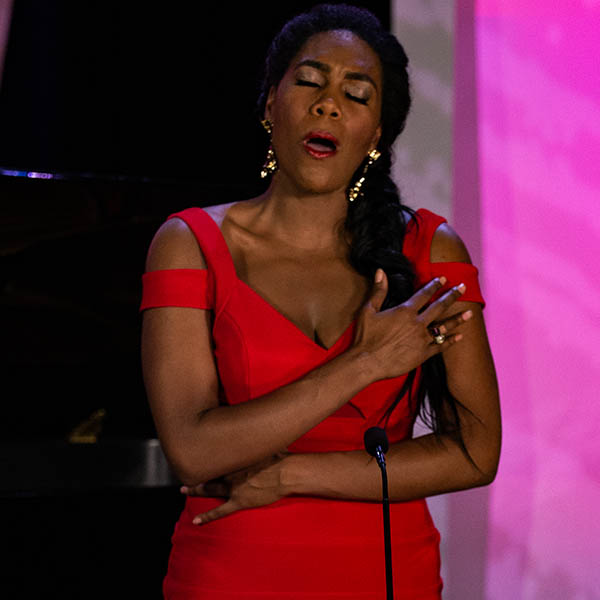
Mezzo-soprano J'Nai Bridges in Lawrence Brownlee and Friends: The Next Chapter.
The more contemporary Black compositions and spirituals rounded out the programming. From Liverman's performance of “Two Black Churches: Ballad of Birmingham and The Rain,” to Bridges's rendition of "Ride On, King Jesus," and Morrison's show-stopping mix of "His Eye Is On the Sparrow" and "My Tribute," the performances made an argument for the unification of music forms.
In some ways, the program is also a showcase for the stories of the artists themselves. They are not just opera singers, and perhaps their musical education began not in opera houses, but in smaller venues—like churches and schools—that focus just as strongly on a performer’s technique and expression. “A lot of people think that all we do is just sing Mozart and other classical composers,” Brownlee begins, “But I think you can show a wide range in a way that people might not expect.”
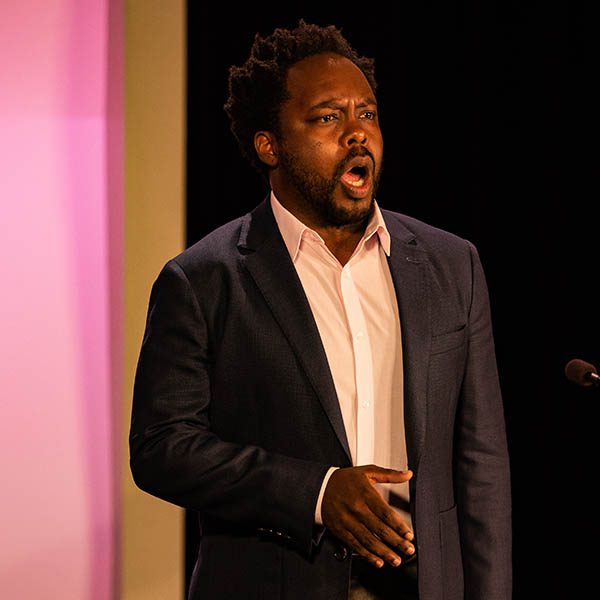
Baritone Will Liverman in Lawrence Brownlee and Friends: The Next Chapter.
And perhaps most importantly, the program highlights the lineage of art forms. They are not as different as they may appear on the surface, with their virtuosic vocals and complex structures. The seemingly most disparate art forms are often aligned in scope and practice.
“One of the things I always hope to do with programming is to connect the dots for the audience, to have the artists sing something they can imagine themselves singing,” Terry says. “To hear Larry Brownlee sing “Come By Here” with stratospheric high notes and such joy, and then to hear him put that same joy and brilliance into his aria from Daughter of the Regiment, and for the audience to then be able to connect those dots and think, ‘Oh, I can imagine myself singing that.’ [It is] a way for us to connect not just with opera audiences, but also other audiences for whom we’re producing this concert to see us in a different way.”
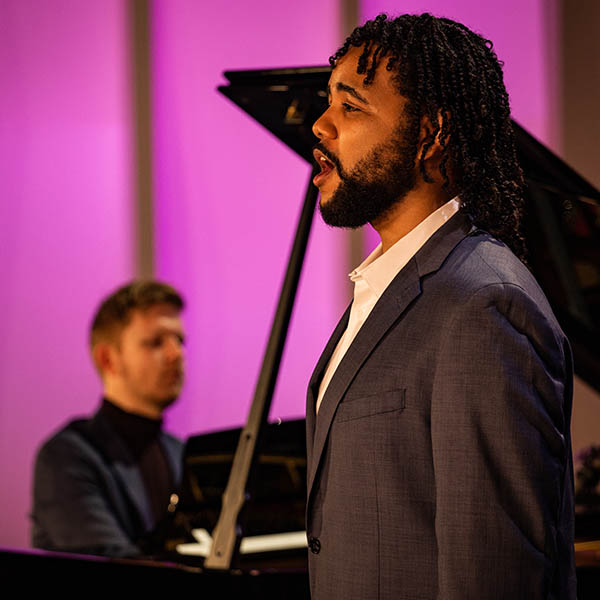
Tenor Martin Luther Clark and pianist Chris Reynolds in Lawrence Brownlee and Friends: The Next Chapter.
Sometimes, it is the very things we feel separate us that demonstrate our similarities. “I think people who may not normally come into the opera house [will] maybe watch this online and say, ‘You know what? I’m actually going to go to an opera. It’s not that much different than some of the other things I’ve heard,’” Brownlee adds. “That all went into the programming: how we could show the versatility, the range, but also some things that people can recognize as opera paired with other genres.” The result is a program that is rich, vivacious, and ultimately, complete in its construction.
According to Brownlee and Terry, there are goals to create more programs like this in the future. Beyond fulfilling the desire to see and hear opera, the event also aligns with Lyric‘s sustained mission to create a more diverse landscape for performers and audiences of color. As Brownlee says, “This is a time to shine a spotlight on singers of color, our voices need to be heard.”
WATCH THE CONCERT
Britt Julious writes about music and nightlife for the Chicago Tribune. She has written for the New York Times, Vogue, Esquire, ELLE, The Guardian, among many others. She is a champion of the underdog and the underground, and was the 2019 recipient of a Studs Terkel Award for journalism.
Photos: Lyric Opera of Chicago
